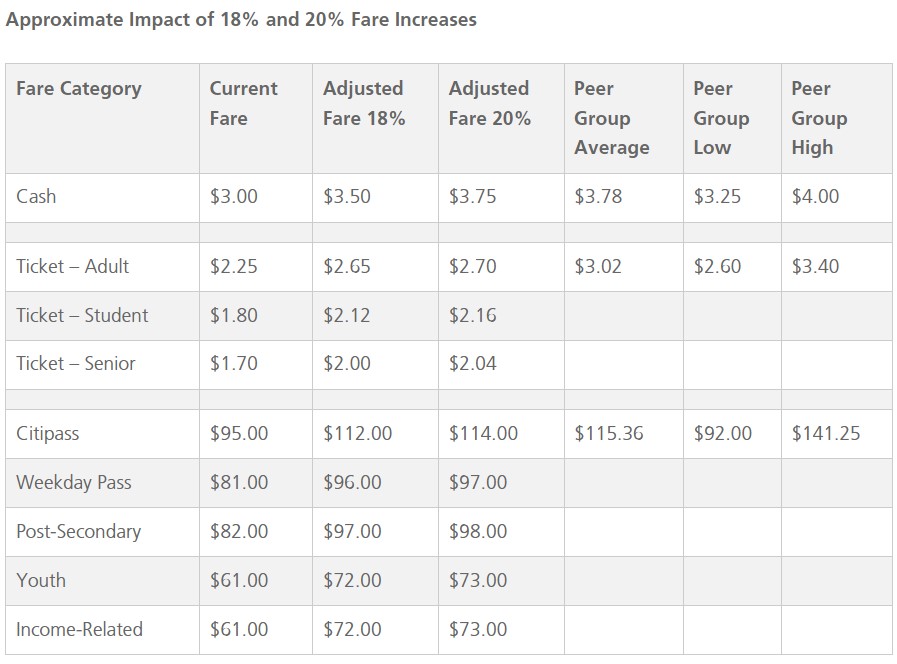To maintain service levels, bus riders in London, Ont., will soon have to pay more money for a trip in the Forest City.

According to a new report going before the London Transit Commission (LTC) on Wednesday, maintaining the status quo when it comes to service levels will require a budget increase of around $10 million from the city in 2024 to a total of $55.9 million.
That marks a 22 per cent increase over 2023.
Kelly Paleczny, LTC general manager, told Global News a fare increase is also on the table in order to generate additional revenue.
“We have also included a fare increase in the budget that needs to raise around $3.5 million,” she said. “We haven’t defined how that will exactly apply to each of the fare categories. If the commission approves this budget, we’ll come back in September.
“I can say on average, fare categories will be adjusted between 18 and 20 per cent in order for us to raise that much revenue.”
The increase is estimated to affect all fare categories.
According to the report, “an increase beyond 20 per cent was not recommended, given increases of that magnitude would be expected to result in ridership losses in the 5 per cent to 10 per cent range.”
Paleczny echoed that sentiment.

Get breaking National news
“The concern with that is if you get much higher than 20 per cent (fare increase), you’re now looking at implications of losing ridership, which is obviously contrary to what we’re trying to achieve as well,” she said.

In preparing for the development of the LTC 2024-27 budget, a report was presented to transit commissioners at the end of May that showcased an array of financial challenges facing the bus system.
The report stated that the 2023-23 multi-year budget was approved prior to the onset of the global pandemic, and as such, did not factor in or contemplate its impacts on public transit over the four-year period.
With the rising costs of general insurance and diesel, as well as transit improvements and route changes, LTC officials said maintaining the status quo is going to cost more, resulting in the commission looking for alternative methods of gaining revenue, including an increase to bus fares.
In 2020, London Transit also increased bus fares by 15 per cent.
Paleczny pointed out that the LTC also dipped into its reserve funds to help balance the budget this year. The recent LTC report said the decision was approved by the commission in April, stating that “the 2023 operating budget included a shortfall of $6.9 million to be offset by a transfer from reserves.”
“Over the period of 2020 through 2022, $27.9 million of Safe Restart funding was utilized to offset pandemic-related budget impacts, which avoided the need to seek additional funding from the City of London or reduce service levels to balance the budget,” read the report.
Paleczny said that they “did have access to safe restart funding that was provided through a partnership with the provincial and federal governments, which was great (and) allowed us to balance those budgets and keep service going, but that that program ended at the end of 2022.”
“(But) 2023 has essentially seen us drawing on the commission’s reserves to balance that budget, and that’s just not sustainable going forward,” she added. “We need to look to our other two options for funding, which are fares and/or the City of London increasing their investment.”

The proposed budget, set to be submitted to city hall, has been divided into two parts: status quo and growth, which is reportedly “consistent with direction from civic administration relating to the multi-year budget process.”
According to the report, LTC officials estimated that a roughly 7.7 per cent increase to the 2024 operating budget is required in order to maintain current service levels for both conventional and paratransit. This increase lifts the total to $109.9 million.
For an additional $2.1 million, LTC officials also recommended adding 22,000 hours of service next year.
LTC is set to consider the draft budget submissions on Wednesday.
“That then gets forwarded to city council,” Paleczny said. “Council deliberates in December and January, so we won’t even know our approved budget for 2024 until sometime in January.”














Comments
Want to discuss? Please read our Commenting Policy first.